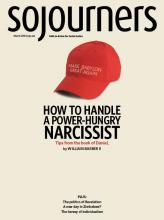I WAS BORN IN Bulawayo, the second largest city in Zimbabwe. Though I now teach and reside in South Africa, my family members still live in various parts of Zimbabwe. In November, I watched as scenes unfolded during a suspenseful week of regime change. A military intervention no one would have predicted set the stage for the resignation of Zimbabwe’s 37-year dictator, Robert Mugabe. Emmerson Mnangagwa became president and will serve out Mugabe’s term.
I was captivated by ordinary citizens’ spontaneous expressions of joy as they took to the streets and expressed their views for the first time without fear of reprisal. Every news station hosted political analysts, church leaders, and members of civil society engaged in rigorous debate on the meaning and impact of the momentous political and economic shifts. They focused on the potential impact on those who have borne the brunt of the economic crisis under Mugabe—which included shortages of money (which made financial transactions a logistical nightmare), widespread corruption, political repression, exceptionally high levels of unemployment, and the looting of profits from the country’s natural resources.
Read the Full Article

